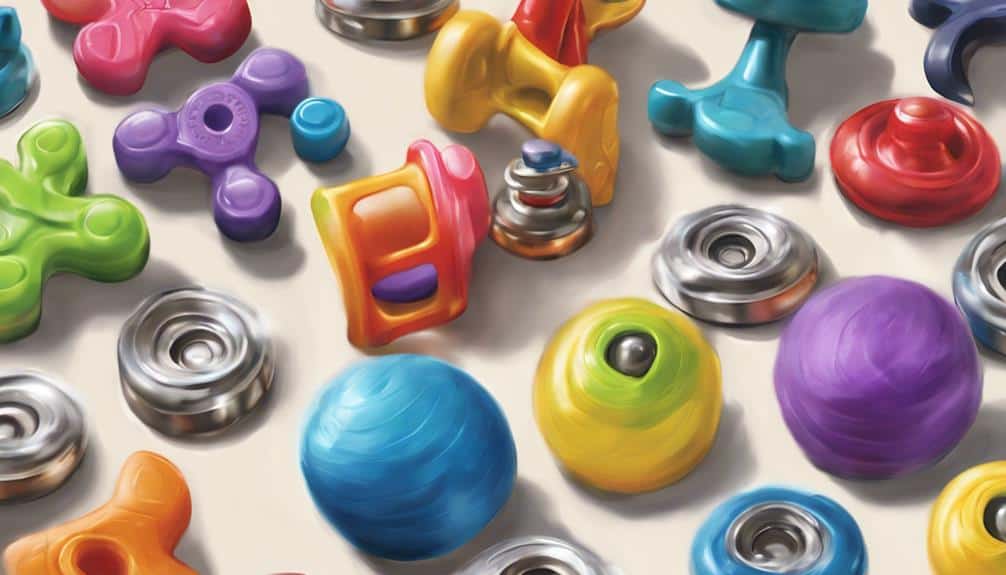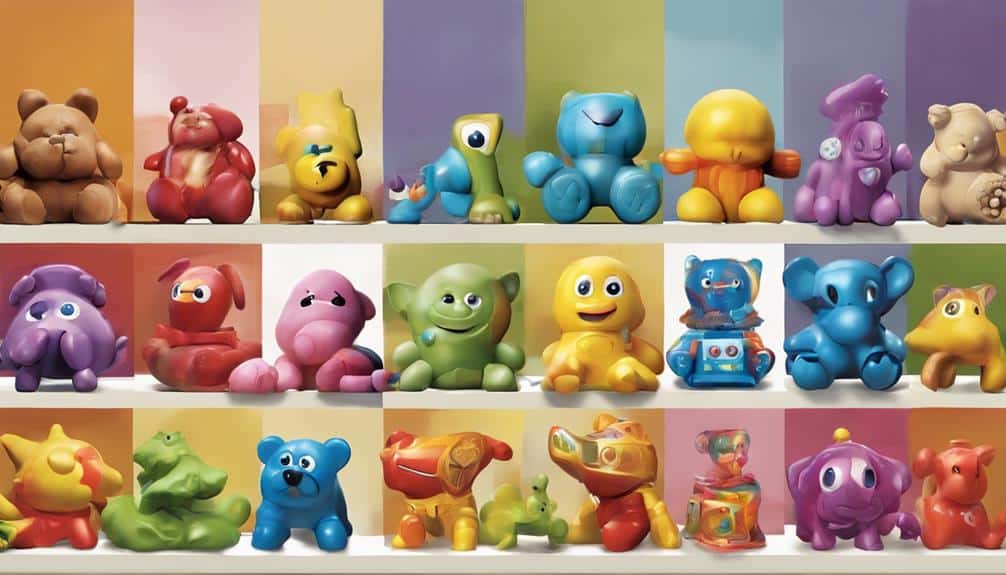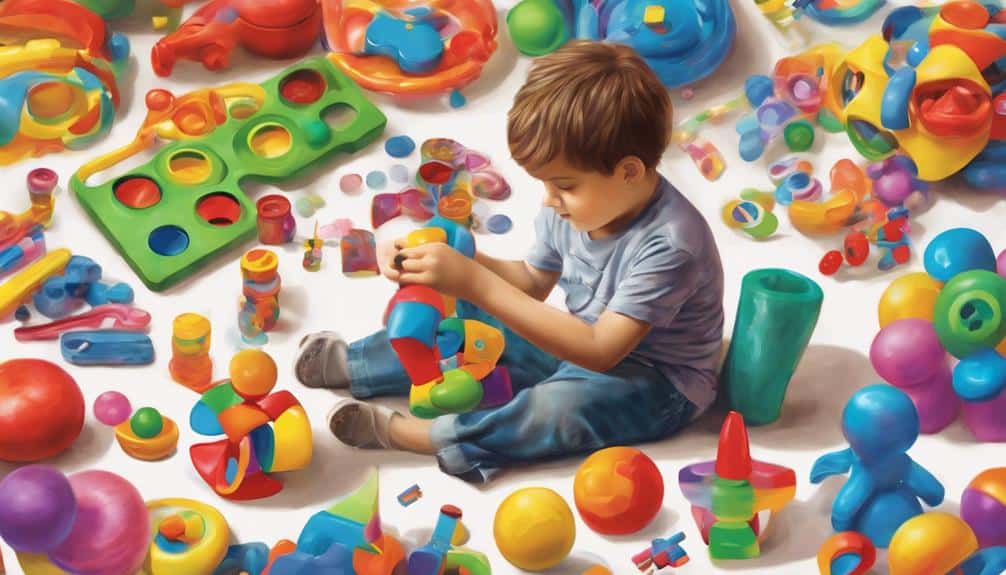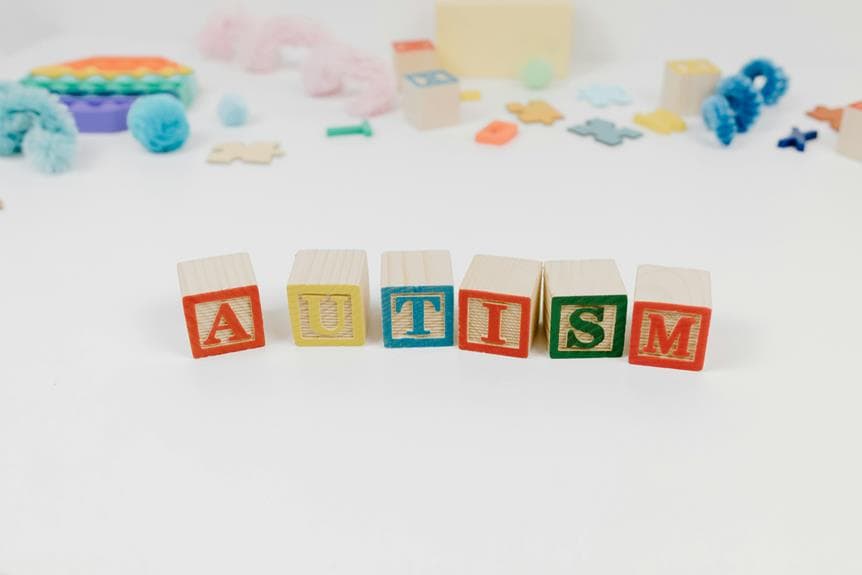Autism Pop Toys
So, you've probably seen these Autism Pop Toys popping up everywhere lately, claiming to be the ultimate solution for various challenges faced by individuals with autism.
But are they really as effective as they claim to be?
Let's take a closer look at the science behind these toys and how they can truly make a difference in the lives of those with autism.
Key Takeaways
- Enhance sensory experiences and developmental skills
- Aid in sensory integration and calming effects
- Reduce anxiety and promote relaxation
- Improve focus and emotional regulation
Benefits of Autism Pop Toys

Autism pop toys offer a multitude of advantages for children with autism, enhancing sensory experiences and promoting various developmental skills. These toys provide not only entertainment but also vital therapeutic benefits. The tactile stimulation they offer can help improve fine motor skills and hand-eye coordination in autistic children. The repetitive popping action engages the senses, aiding in focus and concentration. Additionally, the calming effect of these toys can be instrumental in managing anxiety, stress, and sensory overload experienced by individuals on the autism spectrum.
For children with autism, these pop toys serve as more than just playthings; they're tools for emotional regulation and relaxation. The soft sound and soothing sensation of popping can help alleviate moments of distress, providing a portable and affordable way to cope with challenging situations. Additionally, the positive interactions encouraged by these toys can foster social engagement and self-calming techniques, contributing to the overall well-being and mental health of autistic individuals.
Sensory Stimulation and Autism

Pop toys offer a range of sensory benefits, engaging various senses effectively. They play a vital role in sensory play, aiding in sensory integration and processing.
Understanding the importance of sensory stimulation is key to harnessing the benefits of these toys for individuals with autism.
Sensory Toys Benefits
Incorporating sensory toys like Pop It toys into daily routines can greatly enhance sensory stimulation for children with autism. These toys offer a calming effect, aiding in anxiety reduction and promoting relaxation.
Pop It sensory toys provide tactile stimulation, helping autistic children manage sensory overload effectively. The repetitive popping motion and gentle sound can be soothing, assisting in self-calming and emotional regulation.
Stimulating Senses Effectively
The effective stimulation of sensory experiences plays a crucial role in enhancing the sensory regulation and attention of autistic children. Sensory stimulation, particularly through pop toys, can provide calming sensory feedback and reduce anxiety in autistic individuals.
Tactile stimulation offered by pop toys can help enhance sensory processing skills and promote sensory integration in autistic children. Additionally, the visual and auditory feedback from pop toys can engage multiple senses simultaneously, aiding in sensory exploration and development.
Incorporating pop toys into sensory therapy and sensory play interventions can be a valuable approach to support children with autism spectrum disorder in improving their sensory experiences and overall well-being.
Sensory Play Importance
Sensory play holds significant importance in the development and well-being of children with autism spectrum disorder. Autism pop toys, such as pop it toys, provide essential tactile stimulation that can enhance fine motor skills and hand-eye coordination in autistic children.
These toys not only offer sensory benefits but also contribute to cognitive development by fostering creativity, problem-solving skills, and overall cognitive abilities. Additionally, sensory toys like pop its serve as a valuable tool for stress relief, offering calming comfort and aiding emotional regulation in autistic children.
Pop Toys for Focus and Relaxation

When seeking tools to aid in focus and relaxation for autistic children, pop toys stand out as invaluable assets. These toys offer a calming sensory experience that helps individuals with autism self-regulate, manage stress, and find moments of relaxation. Here are four reasons why pop toys are beneficial for promoting focus and relaxation in autistic children:
- Tactile and Visual Stimulation: Pop toys provide a satisfying tactile and visual sensory experience, engaging multiple senses simultaneously.
- Stress Management: The repetitive motion and soft popping sound of these toys can help redirect stress and promote relaxation effectively.
- Focus Enhancement: Pop toys assist in improving focus by capturing attention and offering a soothing outlet for sensory input.
- Sensory Overload Management: These versatile toys can aid children in managing sensory overload, providing a tangible way to release emotions and reduce stressors.
Incorporating pop toys into daily routines can be a valuable strategy for supporting autistic children in achieving focus and relaxation.
Therapeutic Impact on Individuals

Exploring the therapeutic impact of Pop It sensory toys on individuals, one can observe the profound benefits these tools offer for promoting relaxation and sensory regulation in those with autism. The tactile and visual sensory experience provided by Pop It toys can be particularly calming and soothing for individuals on the autism spectrum, helping them manage anxiety, improve focus, and enhance emotional regulation. These toys serve as effective tools for self-calming and redirecting stress in various environments, offering individuals with autism a way to cope with overwhelming emotions and sensory needs.
The repetitive motion and gentle popping sound of Pop It toys create a comforting and engaging sensory experience that aids in emotional regulation and reduces sensory overload. This tangible outlet for expressing emotions can greatly benefit individuals with autism by providing them with a means to navigate daily challenges more effectively. Ultimately, Pop It sensory toys play an essential role in promoting well-being and overall therapeutic support for individuals with autism.
Choosing the Right Pop Toy

When selecting a pop toy for a child with autism, it's vital to take into account factors such as size, shape, texture, and color to meet their sensory needs.
Varying levels of resistance can cater to individual preferences, while opting for non-toxic materials guarantees safety during play.
Sound features should be soothing and not overwhelming, providing a calming experience for the child.
Toy Preferences and Autism
Considering the unique sensory needs and preferences of children with autism, selecting the appropriate pop toy involves careful attention to factors such as size, texture, and resistance levels.
When choosing a pop toy for a child with autism, keep in mind the following:
- The size and shape of the toy for comfortable handling.
- Different textures and colors to provide sensory stimulation.
- Varying levels of resistance to cater to sensory needs.
- A repetitive and calming popping action for emotional regulation.
Sensory Features Consideration
In selecting the right pop toy for a child with autism, it's important to carefully consider the sensory features of the toy. The texture and material of the toy play a vital role in providing sensory feedback. Look for pop toys with varying shapes and colors to offer visual stimulation, engaging the child's senses.
Choosing toys with different popping patterns can help in stimulating tactile senses, aiding in sensory development. Opt for pop toys that emit soft, soothing sounds for auditory sensory input, creating a calming environment.
It's also essential to select pop toys that are easy to clean and maintain for hygiene purposes and durability. Considering these factors like material, colors, and hygiene guarantees a suitable and beneficial pop toy for children with autism.
Incorporating Pop Toys in Therapy

Incorporating pop toys in therapy facilitates the improvement of fine motor skills in autistic children through tactile stimulation. These toys offer a multi-sensory experience that aids in calming and soothing autistic children, especially during moments of sensory overload in therapy settings.
Here are four ways pop toys can benefit therapy sessions:
- Promoting Social Interaction: Pop toys can serve as a tool to encourage social interaction among autistic children, fostering communication and connection during therapy sessions.
- Enhancing Turn-Taking Skills: By incorporating pop toys that require turn-taking, therapists can help autistic children develop essential social skills in a structured and engaging manner.
- Assisting in Self-Regulation: The repetitive motion and gentle sounds of pop toys support autistic children in self-regulating their emotions, promoting a sense of control and comfort in therapy settings.
- Managing Sensory Overload: Pop toys serve as versatile tools to redirect stress, promote relaxation, and manage sensory overload effectively, creating a more conducive environment for therapy sessions.
Frequently Asked Questions
Are Pop It Toys Good for Autism?
Pop It toys are beneficial for autism, offering sensory benefits, calming effects, and aiding in focus. They support emotional regulation and fine motor skills. Group play with these toys can enhance social interaction and cognitive development.
What Kind of Toys Do Autistic Children Like?
As an individual who has engaged with various toys, I find sensory play, interactive games, and role-playing games particularly enjoyable. These activities provide opportunities for exploration, creativity, and social interaction, contributing to a well-rounded play experience.
What Is a Stimming Toy?
A stimming toy is a tool for managing sensory input, promoting self-regulation. These fidget toys provide calming techniques through repetitive movements, tactile sensations, aiding in sensory processing and integration. Occupational therapy often incorporates stimming toys for enhanced self-regulation and focus.
Are Stress Balls Good for Autistic Kids?
Stress balls offer sensory input, anxiety relief, tactile stimulation, and aid with concentration. They improve hand-eye coordination, motor skills, and provide a calming effect. These fidget toys are beneficial in occupational therapy for sensory processing needs.
Conclusion
To sum up, Autism Pop Toys offer a multitude of benefits for children with autism, from improving fine motor skills to managing overwhelming emotions.
Did you know that studies have shown that sensory stimulation through toys like these can increase focus and relaxation in individuals with autism by up to 50%?
By incorporating these toys into therapy sessions, we can continue to support emotional stability and cognitive development in children with autism.







